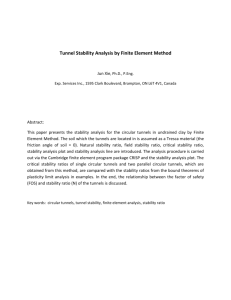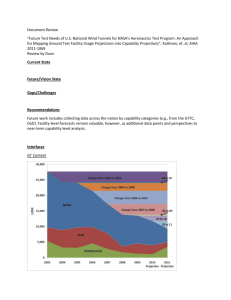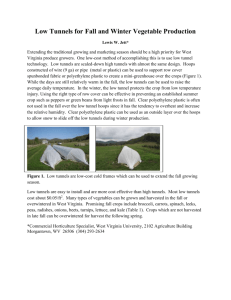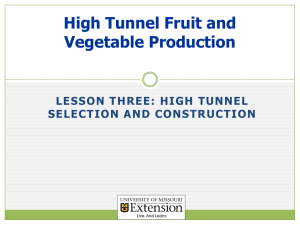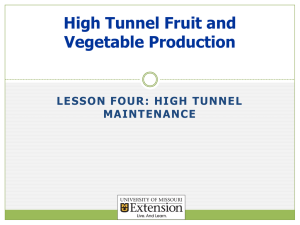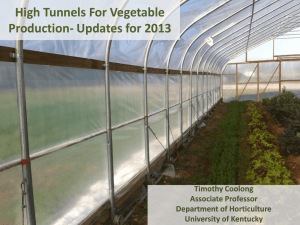New Horticultural Crop and Production Techniques for the North Part 2
advertisement
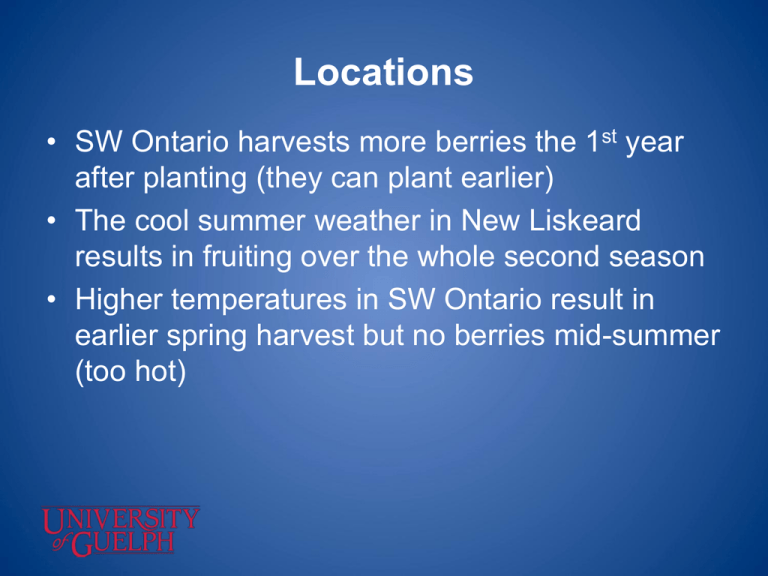
Locations • SW Ontario harvests more berries the 1st year after planting (they can plant earlier) • The cool summer weather in New Liskeard results in fruiting over the whole second season • Higher temperatures in SW Ontario result in earlier spring harvest but no berries mid-summer (too hot) High Tunnels High Tunnels • Modify the climate on a field scale • Extend the growing season in spring and fall (depending on when covered) High Tunnels • Increase air and soil temperature • Protect fruit from rain • Affect disease and insect populations • Low cost compared to a greenhouse High Tunnels 3-bay high tunnel (30 m x 24 m) installed in New Liskeard Aug 2010 with funding from the Northern Ontario Heritage Fund (NOHFC) New Liskeard High Tunnel • Sides covered at all times • Roof vented for summer months & closed in early spring and late fall • Doors closed if < 4 °C Marketable Yield 7 6 5 kg/m 4 High tunnel not covered until mid-August 2010 Albion Monterey 3 Portola Seascape 2 1 0 Outside High tunnel 2010 Outside High tunnel 2011 Seascape in Cedar Springs Overwintering Standard in New Liskeard – Straw mulch with a floating row cover on top 2010-11 Overwinter Trial 1. 2. 3. No winter cover Heavy row cover removed at blossom (when there are 3-4 open blossoms per plot) Straw + heavy cover % Winter Survival 2010/11 100 90 80 outside 70 high tunnel 60 50 nothing 42 g cover Albion straw + cover nothing 42 g cover Seascape straw + cover Albion Days to 1st harvest 2011 25 20 Outside 15 High tunnel 10 5 0 No cover 42g cover Straw+cover 30 Days to harvest (1 = June 1) Days to harvest (1 = June 1) 30 Seascape 25 20 Outside 15 High tunnel 10 5 0 No cover 42g cover Straw+cover Effect of winter cover on yield in 2011 4.5 4.0 3.5 a b Yield (kg/m) 3.0 2.5 b 2.0 1.5 Unmarketable yield a b a 1.0 0.5 0.0 No cover 42g cover Straw+cover Marketable yield No winter cover x environment or winter cover x cultivar interactions What would I do as a grower? • Grow Seascape, some Albion and try Portola • Grow outside and in a high tunnel both on black mulch • Plant early with the best plants possible and pick blossoms for 4 weeks • Overwinter 2 ways move the picking peaks & reduce risk • More research – runner removal, more over-wintering treatments, etc Other Potential Crops for High Tunnels • Fall-bearing – Autumn Britten – Joan J – Polka • Summer-bearing – Nova – Prelude Vegetable Crops Single high tunnels • More rapid temperature fluctuations • Higher temperatures • Limited frost protection Multi-bay high tunnels •Lower cost per unit area •Large enough for field equipment •Higher temperatures than outside but not as high as single tunnels •4 °C frost protection Cool Season Vegetable Crops • Often grown in single span high tunnels (hoop houses) • University of Saskatchewan research has shown you can get more crops of lettuce in a hoop house than in a multi-bay high tunnel ⏎ • Temperatures in the midsummer may be too hot for these crops • Floating row covers often used inside the hoop house for frost protection Warm Season Vegetable Crops • Can extend the growing season in hoop houses and multi-bay tunnels • Higher temperatures accelerate growth and increase yields of some crops • Improved quality Disadvantages: • cost • plastic installation and handling • wind!! • high tunnel management • soil management and crop rotation • water runoff • heat stress/excessive temperatures • spider mites and powdery mildew Sources of Information Strawberry and Raspberry Research in northern Ontario: Becky Hughes University of Guelph, NLARS PO Box 6007, 340 Armstrong St New Liskeard ON P0J 1P0 705-647-8525 Fax 705-647-9315 Email bhughes@uoguelph.ca Production Information: www.omafra.gov.on.ca/english/crop s/hort/berry.html Agricultural Information Contact Centre: 1-877-424-1300 or e-mail ag.info.omafra@ontario.ca www.leopold.iastate.edu or 515-294-3711 Acknowledgements Funding for the research trials at NLARS came from: Ontario Berry Growers Association (OBGA) CanAdvance, AAC Farm Innovation Program, AAC Northern Ontario Heritage Fund Corporation Canadian Horticultural Council, Canadian Agri-Science Cluster for Horticulture (AAFC) OMAFRA/University of Guelph Partnership


